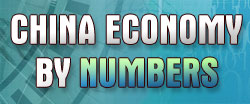
BEIJING - Industrial production and investment have continued to falter in China, dimming hopes for a robust recovery in the world's second-largest economy this year, official data showed Sunday.
China's industrial value-added output expanded 8.9 percent year-on-year in August, down from 9.2 percent in July and and the slowest rate since May 2009, according to figures from the National Bureau of Statistics (NBS).
Urban fixed-asset investment increased 20.2 percent year-on-year to 21.8 trillion yuan ($3.4 trillion) in the January-August period, 0.2 percentage points slower than the growth of the January-July period.
Private fixed-asset investment went up 25.1 percent to 13.5 trillion yuan, down 0.4 percentage points from the January-July period.
Annual retail sales growth accelerated to 13.2 percent in August from 13.1 percent in July, although inflation-adjusted growth actually slowed by 0.1 percentage points from July to 12.1 percent.
Analysts attributed the economic slowdown to diminishing external demand and authorities' hesitance to issue stimulus policies for fear of stoking inflation.
The impact of the eurozone crisis was underestimated, while credit injections were smaller than expected because of weak borrowing demand, said Liu Yuanchun, deputy head of the School of Economics at Renmin University of China.
He predicted the weakness to last in the third quarter, although accelerated government investment and previous pro-growth policies may make some difference.
"China's economy is still in the trough and this situation is likely to go on longer than expected," said Liu. "Even if we see a recovery in the fourth quarter, it will be a mild one."
 |
Flagging demand from Europe, as well as from the United States and Japan, slowed the country's year-on-year export growth to a mere 1 percent in July.
Wang Jun, a researcher with the China Center for International Economic Exchanges, said exports in August will likely see zero or even negative growth.
He viewed the government's response to the economic slowdown as "too conservative," as policymakers are worried that aggressive lending could drive inflation up.
The central bank has cut its lending and deposit rates twice this year, as well as lowered the amount of funds that banks must keep in reserve.
China's consumer price index rose 2 percent year-on-year in August, accelerating from 1.8 percent in July, due to food price hikes, according to data released by the NBS earlier Sunday.
The interest rate cuts have led to warming in the property market, adding to market concerns that authorities will refrain from further easing in order to keep housing prices in check, said Liu.